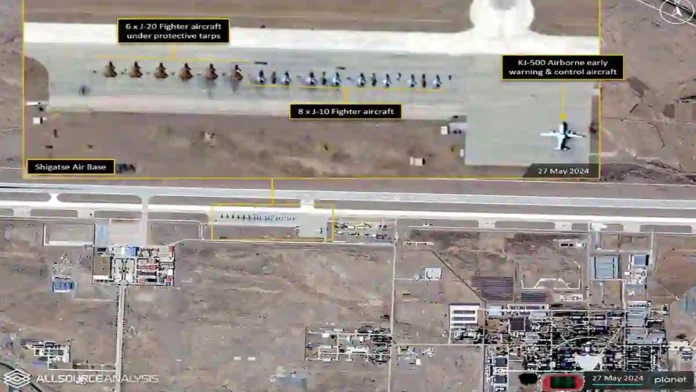Satellite images gathered on May 27 show that China has deployed its most advanced J-20 stealth fighter jets less than 150 kilometres from the boundary with India in Sikkim, reported NDTV.
The image reveals the presence of six Chinese Air Force J-20 stealth fighters on the flight-line at a dual-use military and civilian airport which serves Shigatse, the second-largest city in Tibet. The airport lies at an altitude of 12,408 feet, making it among the highest airports in the world. A KJ-500 Airborne Early Warning and Control Aircraft is also visible.
The Indian Air Force (IAF), which is aware of the deployment of the J-20 fighters, has declined to comment on their presence at this time.
“The J-20 stealth fighter is China’s most advanced operational fighter aircraft to date, and these aircraft are predominantly based in the eastern provinces of China,” according VP for Technology and Analysis at All Source Analysis. “Seeing these aircraft appear at Shigatse in Tibet positions them on a deployment outside of their normal areas of operations and within proximity of the Indian border.”
India counters the J-20 with its fleet of 36 French-built Rafale fighters, eight of which have presently flown to Alaska for advanced air combat exercises with the United States Air Force (USAF). Significantly, Shigatse, where the Chinese J-20 has been spotted, lies less than 290 km from Hasimara (below) in West Bengal, where India bases its second squadron of 16 Rafales.
This isn’t the first time the J-20 has been deployed in Tibet. The jets have been observed in Xinjiang in China’s Hotan prefecture between 2020 and 2023. This, however, is believed to be the largest deployment of the J-20 which has been spotted by commercially available satellite imagery.
Read- China facing heat as India and more Asian Countries plan Aircraft Carriers
The Chengdu J-20, also known as the Mighty Dragon, is a twin-engine stealth fighter which was introduced into service in 2017. Some reports suggest China may already have deployed as many as 250 of the stealth fighters which are difficult to observe by radar.
With the induction of the fighter, China emerged as the third country in the world to operationally field stealth fighters. The jet, which is equipped with an array of sensors, is being constantly modernised. Its primary role is as an air superiority fighter, and it carries China’s most advanced air-to-air missiles, including the PL-15 long-range air-to-air missile which is believed to have the ability of striking aerial targets up to 300 km away.
“China has steadily built up its air power capacity in Tibet and other areas near India over the past five years. This has primarily consisted of the construction of new air bases and upgrading the infrastructure at existing air bases,” says Sim Tack. China has also begun deploying aircraft such as the J-20 and its H-6 nuclear-capable bombers to these border regions, at least on a temporary basis.
India matches this Chinese airfield expansion by significantly upgrading its own airbases with hardened shelters for its aircraft in addition to expanding its tiered surface-to-air missile defences, which has included the deployment of the Russian-built S-400 long-range surface-to-air missile system in eastern India. The deployment of the S-400 system, which reportedly has the ability to track stealth platforms, is designed to deter offensive Chinese fighter sweeps along the Line of Actual Control (LAC).
(With Reporting by NDTV News)




